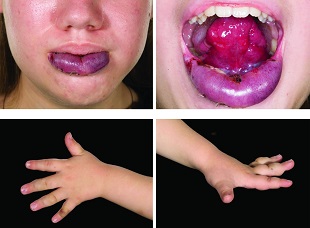 Mutations in the PIK3CA gene are linked to venous malformations in the lip, tongue, and hand.SCIENCE TRANSLATIONAL MEDICINE, S. CASTILLO ET AL. (VIA EUREKALERT)Congenital defects in normal blood vessel growth can cause disfiguring lesions called venous malformations (VM) that affect around 1 in 5,000 people. The principal cause of these lesions—mutations in the TEK gene—only accounts for about 50 percent of cases, leaving the remainder largely unexplained. Recently, while studying PIK3CA, a cancer gene coding for a protein involved in cell growth and proliferation, a team led by researchers at University College London discovered a role for this gene in causing VM in mice and humans. The team’s findings were published yesterday (March 30) in Science Translational Medicine.
Mutations in the PIK3CA gene are linked to venous malformations in the lip, tongue, and hand.SCIENCE TRANSLATIONAL MEDICINE, S. CASTILLO ET AL. (VIA EUREKALERT)Congenital defects in normal blood vessel growth can cause disfiguring lesions called venous malformations (VM) that affect around 1 in 5,000 people. The principal cause of these lesions—mutations in the TEK gene—only accounts for about 50 percent of cases, leaving the remainder largely unexplained. Recently, while studying PIK3CA, a cancer gene coding for a protein involved in cell growth and proliferation, a team led by researchers at University College London discovered a role for this gene in causing VM in mice and humans. The team’s findings were published yesterday (March 30) in Science Translational Medicine.
“We originally set out to investigate cancer by inducing PIK3CA mutations in mice, with no idea that they might be linked to other diseases,” study coauthor Bart Vanhaesebroeck of the University College London Cancer Institute explained in a statement. “It is incredibly exciting to have stumbled across new treatment options for these blood vessel disorders, essentially by accident.”
After engineering mice with mutations in the PIK3CA gene, the researchers quickly noticed the growth of swollen and deformed blood vessels in the animals. When they analyzed VM in human patients using deep sequencing, the researchers also found that PIK3CA mutations were present in around half of the cases in which TEK mutations were absent.
The findings support “the theory that blood vessels are much more sensitive ...




















